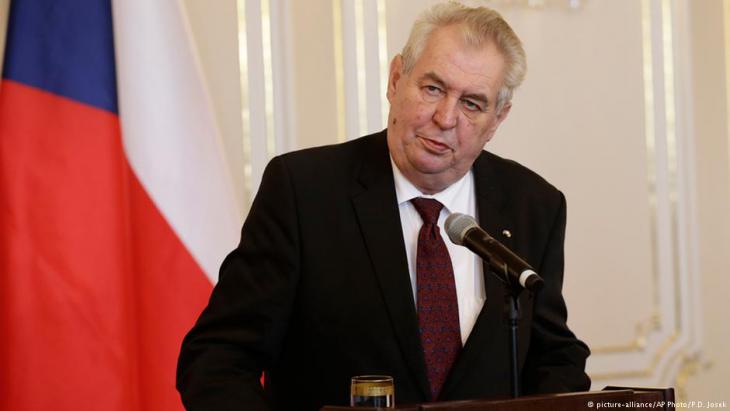
Europe’s Fearmonger: Czech President Milos Zeman′s re-election
This op-ed by Bridge Initiative Senior Research Fellow Farid Hafez originally appeared in Qantara.
The Czech Republic has once again elected Milos Zeman as president, a leader who applauds Donald Trump’s ban on Muslims entering the USA and who sees himself as a prophet warning against immigration and an imagined Islamic threat.
Zeman has attained considerable international prominence as a notorious Islamophobe, even though he presides over a parliamentary republic with a population of just over ten million. Nevertheless, the election duel which came to a head in January drew the attention of many.
A number of international commentators had set their hopes on a more liberal candidate like Jiri Drahos as the new Czech president. But the winner of the election battle, with a slim majority of 51.5 percent of the votes, was once again Milos Zeman, the former Social Democrat prime minister and in 2013 the first directly elected president of the Czech Republic.
Zeman is against the European Union and against immigration and endorses a pro-Russian foreign policy. He is infamous for his Islamophobic conspiracy theories, which he regularly shares with the public. And which, like his other positions, do not represent the views of the traditional political establishment.
He called attention to himself in 2014 with his allegations that the attacks on a Jewish museum in Brussels were not attributable to individual perpetrators, but rather to Islam per se. Zeman pronounced that those of the Muslim faith were anti-Semitic and racist Nazis, a case of the pot calling the kettle black.
Conspiracies everywhere
Zeman sees Islamisation not only as a general conspiracy but points a finger in a specific direction, claiming that the streams of refugees from Syria and Iraq constitute a conspiracy of the Muslim Brotherhood. For lack of military strength, the Brotherhood is allegedly now driving forward the Islamisation of Europe with a steady flood of warm bodies in order to then seize control. He called it an “organised invasion.”
Zeman sees Islamisation not only as a general conspiracy but points a finger in a specific direction, claiming that the streams of refugees from Syria and Iraq constitute a conspiracy of the Muslim Brotherhood. For lack of military strength, the Brotherhood is allegedly now driving forward the Islamisation of Europe with a steady flood of warm bodies in order to then seize control. He called it an “organised invasion.”

The sources he cited were the former Moroccan foreign minister and the crown prince of the United Arab Emirates. Finally, he warned that the Czechs would resort to arms in order to stave off the “super Holocaust” by Muslim terrorists.
With this discourse, Zeman outs himself as a friend not of the establishment, but of the right wing. On the 17 November 2015, the Czech national holiday, he stood side by side with Martin Konvicka, the founder of a movement described by Czech Prime Minister Bohuslav Sobotka, a Social Democrat, as a xenophobic association. All of this must be seen against the backdrop of an estimated minority of 10,000 Muslims in the country.
A lack of civil resistance
There are scarcely any civil organisations in the Czech Republic willing to stand up against racism and against the ailing Zeman with his slim electoral majority. Recently, the annual meeting of the right-wing EU parliamentary group “Europe of Nations and Freedom” (ENF) had to contend with a mere 500 counter-demonstrators. And in the new and unstable government, Zeman will probably encounter even less opposition than before.
This is because the last parliamentary elections, in October 2017, once again saw an upsurge in the Czech right wing. The billionaire Andrej Babis started up a movement out of nothing with his liberal populist ANO party and took 78 seats of the 200 in parliament.

Only the right-wing populist “Freedom and Direct Democracy” party (SPD) offered a wafer-thin mathematical majority with which to form a coalition government. The SPD emerged from the race with 22 seats as the second-strongest party and supported Milos Zeman for president. But then the attempt to form a government failed and the parliament lifted Babis’ immunity to enable investigations into the theft of 1.6 million euros in EU funding. Zeman reacted by promising to return to Babis the government mandate to form a coalition. Some common ground could certainly be found with the SPD.
Read the full article here.

 Search
Search